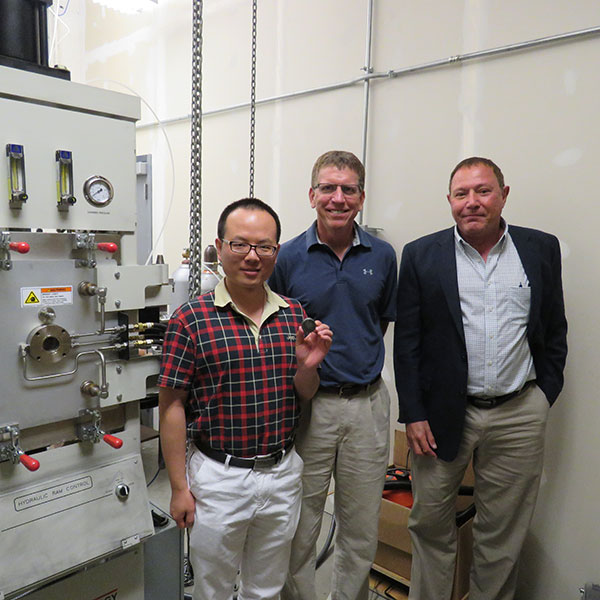
A recent grant from the Nuclear Regulatory Commission (NRC) will bolster engineering research into nuclear energy and could provide multiple benefits to the College of Engineering, its future students and the State of Nebraska.
The Department of Mechanical and Materials Engineering received a three-year, $450,000 NRC Faculty Development Grant to support the research of Bai Cui, assistant professor of mechanical and materials engineering. Chair Jeffrey Shield and professor Michael Nastasi collaborated on the grant application, which is intended to support the research of younger faculty – defined as those in the first six years of their academic career.
https://go.unl.edu/0hz4
- - - - - - -
Nebraska researchers, including chemical and biomolecular engineer Yasar Demirel, have broken through a theoretical limit on hydrogen that bacteria could produce by presenting those bacteria with a simple choice — adapt or die. The feat represents a breakthrough in the global effort to scale up the sustainable production of clean-burning hydrogen for vehicles and heavy industry. Most commercial hydrogen comes from refining non-renewable fossil fuels, a process that generates large amounts of carbon dioxide.
https://go.unl.edu/co4z
- - - - - - -
Research of Nebraska Engineering faculty were in the spotlight in July as University Communication celebrated Shark Week by discussing shark-related topics with University of Nebraska-Lincoln faculty.
Tim Wei, professor of mechanical and materials engineering, discussed how sharks swim and weighed in on whether it could be possible to engineer performance to allow humans to swim as fast as sharks.
https://go.unl.edu/8mzr
Ali Tamayol and Prahalada Rao, both assistant professors of mechanical and materials engineering, talk about the possibility of using 3-D printing to create biological replacement parts for people with serious injuries, including shark bites.
https://go.unl.edu/ijor
Honed by 450 million years of evolution, shark skin offers a near-perfect design for gliding effortlessly through water. A Nebraska Engineering team led by Dennis Alexander, professor of electrical and computer engineering, is working to translate that evolutionary advantage — and others crafted by Mother Nature — onto metal surfaces. Ultimately, the work will give metal the same unique properties, allowing it to be used for defense and industrial purposes.
https://go.unl.edu/id49
- - - - - - -
Three faculty from Biological Systems Engineering -- Dean Eisenhauer, Yufung Ge and Derek Heeren -- were recognized as major award recipients Aug. 1 at the annual American Society of Agricultural and Biological Engineers awards luncheon. Eisenhauer, emeritus professor of biological systems engineering and a consultant to the office of vice president/vice chancellor, was honored among the ASABE Fellows Class of 2018. Ge, assistant professor of biological systems engineering, received the New Holland Young Researcher Award. Heeren, associate professor of biological systems engineering, received the A.W. Farrall Young Educator Award.